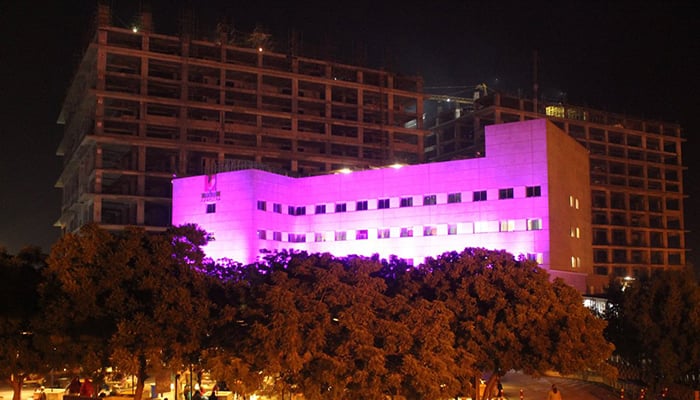Indus Hospital turns pink in solidarity with breast cancer patients and survivors
Breast cancer affects approximately 2.1 million women worldwide every year. In Asia, Pakistan has the highest rate of breast cancer, said a statement issued by The Indus Hospital on Wednesday.
At some stage of life, one in nine Pakistani women encounter breast cancer while the number is much lower for men, i.e. one in 1,000. Every October, Breast Cancer Awareness Month marks a month-long campaign to help increase awareness of the disease and honour the bravery of
patients.
The Indus Health Network (IHN) illuminated The Indus Hospital’s (TIH) Korangi campus, Sheikh Saeed Memorial Campus, and Al-Fakir Trust Campus buildings pink to show solidarity with breast cancer patients. The initiative was taken to draw attention and acknowledge the bravery of cancer survivors.
During the drive, pink ribbons were also distributed among patients, visitors
and staff. According to Dr Nuzhat Irfan Malik, consultant radiologist at The Indus Hospital, to improve breast cancer outcomes and survival, early detection and screening were highly important.
“Early diagnosis helps in providing timely access to cancer treatment and improves access to effective diagnosis services. Screening consists of testing women to identify cancers before any symptoms appear.”
The Indus Hospital has been offering diagnostic and surgical services to breast cancer patients since 2007 and soon plans to launch an exclusive breast cancer clinic. Since 2007, 1,497 patients have visited TIH for consultation 777 of them were diagnosed with breast cancer, while 507 biopsies and 652 mastectomies have been performed.
The Indus Hospital
Initiated by some doctors, philanthropists, and businessmen, in 2007, Indus Hospital started providing quality and free healthcare to all in a 150-bed hospital in Karachi.
Changing the paradigm of healthcare in Pakistan, Indus has now evolved into the Indus Health Network (IHN). The IHN is managing 12 hospitals across Pakistan, four of them are IHN-owned while eight are public hospitals, run and managed under a public-private partnership programme.
Global Health Directorate (GHD) is the public health arm of the IHN. It implements community and facility-based programmes across the country. The GHD runs community-based public health programmes across the country to control TB, malaria, HIV, hepatitis, and AIDS. The IHN’s Research Centre makes targeted efforts towards improving health in underprivileged communities/ low-income households.
The IHN is running four physical and rehabilitation centres in the country. The IHN has a modern blood transfusion service at Korangi Campus and it has four regional blood centres. The IHN model is being used as a case study in the Global Health Directory Project of the Harvard
University.
-
 Dwayne Johnson Confesses What Secretly Scares Him More Than Fame
Dwayne Johnson Confesses What Secretly Scares Him More Than Fame -
 Elizabeth Hurley's Son Damian Breaks Silence On Mom’s Romance With Billy Ray Cyrus
Elizabeth Hurley's Son Damian Breaks Silence On Mom’s Romance With Billy Ray Cyrus -
 Shamed Andrew Should Be Happy ‘he Is Only In For Sharing Information’
Shamed Andrew Should Be Happy ‘he Is Only In For Sharing Information’ -
 Apple Sued Over 'child Sexual Abuse' Material Stored Or Shared On ICloud
Apple Sued Over 'child Sexual Abuse' Material Stored Or Shared On ICloud -
 Nancy Guthrie Kidnapped With 'blessings' Of Drug Cartels
Nancy Guthrie Kidnapped With 'blessings' Of Drug Cartels -
 Hailey Bieber Reveals Justin Bieber's Hit Song Baby Jack Is Already Singing
Hailey Bieber Reveals Justin Bieber's Hit Song Baby Jack Is Already Singing -
 Emily Ratajkowski Appears To Confirm Romance With Dua Lipa's Ex Romain Gavras
Emily Ratajkowski Appears To Confirm Romance With Dua Lipa's Ex Romain Gavras -
 Leighton Meester Breaks Silence On Viral Ariana Grande Interaction On Critics Choice Awards
Leighton Meester Breaks Silence On Viral Ariana Grande Interaction On Critics Choice Awards -
 Heavy Snowfall Disrupts Operations At Germany's Largest Airport
Heavy Snowfall Disrupts Operations At Germany's Largest Airport -
 Andrew Mountbatten Windsor Released Hours After Police Arrest
Andrew Mountbatten Windsor Released Hours After Police Arrest -
 Heidi Klum Eyes Spooky Season Anthem With Diplo After Being Dubbed 'Queen Of Halloween'
Heidi Klum Eyes Spooky Season Anthem With Diplo After Being Dubbed 'Queen Of Halloween' -
 King Charles Is In ‘unchartered Waters’ As Andrew Takes Family Down
King Charles Is In ‘unchartered Waters’ As Andrew Takes Family Down -
 Why Prince Harry, Meghan 'immensely' Feel 'relieved' Amid Andrew's Arrest?
Why Prince Harry, Meghan 'immensely' Feel 'relieved' Amid Andrew's Arrest? -
 Jennifer Aniston’s Boyfriend Jim Curtis Hints At Tensions At Home, Reveals Rules To Survive Fights
Jennifer Aniston’s Boyfriend Jim Curtis Hints At Tensions At Home, Reveals Rules To Survive Fights -
 Shamed Andrew ‘dismissive’ Act Towards Royal Butler Exposed
Shamed Andrew ‘dismissive’ Act Towards Royal Butler Exposed -
 Hailey Bieber Shares How She Protects Her Mental Health While Facing Endless Criticism
Hailey Bieber Shares How She Protects Her Mental Health While Facing Endless Criticism




